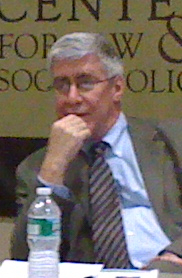Jeremy Waldron facts for kids
Quick facts for kids
Jeremy Waldron
|
|
|---|---|

Waldron in 2010
|
|
| Born | 13 October 1953 |
| Alma mater | University of Otago (BA, LLB) Lincoln College, Oxford (DPhil) |
| Partner(s) | Carol Sanger |
| Era | Contemporary philosophy |
| Region | Western philosophy |
| School | Analytic Legal positivism |
| Doctoral advisor | Ronald Dworkin Alan Ryan |
|
Main interests
|
Legal philosophy |
|
Notable ideas
|
Criticism of judicial review The harm in hate speech lies in its defamatory nature Hate speech should not be protected by the First Amendment |
|
Influences
|
|
Jeremy Waldron (born 13 October 1953) is a very important legal philosopher from New Zealand. A legal philosopher is someone who studies the ideas behind laws and how they should work. He teaches at the New York University School of Law and used to be a professor at Oxford University. Many people think Waldron is one of the best legal and political thinkers in the world.
Contents
Early Life and Education
Jeremy Waldron went to Southland Boys' High School in New Zealand. After that, he studied at the University of Otago. He earned two degrees there: a Bachelor of Arts (B.A.) in 1974 and a Bachelor of Laws (LL.B.) in 1978.
Later, he went to Lincoln College, Oxford, in England. There, he worked on his D.Phil., which is a very advanced university degree, like a Ph.D. His teachers were famous legal philosopher Ronald Dworkin and political thinker Alan Ryan. Waldron finished his D.Phil. in 1986.
Career Highlights
Jeremy Waldron has taught at many well-known universities around the world. He taught legal and political philosophy at places like the University of Edinburgh in Scotland, UC Berkeley School of Law in the United States, and Princeton University. From 1997 to 2006, he taught at Columbia Law School.
Today, he teaches at New York University. He leads discussions on important topics like the Rule of Law and human Dignity. He also hosts a special discussion group about legal, social, and political philosophy.
Waldron has given many important lectures at top universities, including Yale Law School and the University of Edinburgh. In 1998, he was chosen to be a member of the American Academy of Arts and Sciences. This is a group that honors leading thinkers. In 2005, his old university, the University of Otago, gave him an honorary doctorate. This is a special degree given to people who have achieved great things. In 2015, he was also elected to the American Philosophical Society.
In 2019, the University of Otago created a special teaching position in his name. It is called the Professorial Chair in Jurisprudence.
Important Ideas and Views
Jeremy Waldron is known for his strong beliefs about law and society. He is a "liberal," which means he believes in individual rights and freedoms. He is also a "legal positivist," meaning he thinks laws are rules made by people, not necessarily based on moral ideas.
He has written a lot about private property and the ideas of the philosopher John Locke. Waldron believes that private property is important for people's freedom.
Views on Law and Democracy
Waldron has some strong opinions on how laws should be made and judged.
- Judicial Review: He does not agree with "judicial review" of laws. This is when courts can decide if a law passed by a government is fair or follows the country's constitution. Waldron believes that elected lawmakers should have the main power to create laws, not judges. He thinks that judges overturning laws can go against democratic principles, where the people's representatives make the rules.
- Torture: He is strongly against torture. He believes it goes against democratic values and human rights.
- Hate Speech: Waldron also believes that hate speech should not be protected by the First Amendment in the United States. The First Amendment protects freedom of speech. However, Waldron argues that hate speech can be very harmful because it attacks people's dignity and can be like defamation (spreading false and damaging information).
Human Dignity
More recently, Waldron has focused on the idea of human dignity. He is trying to explain what human dignity means without using religious ideas or the ideas of the philosopher Immanuel Kant. He suggests thinking about it as if everyone is born with a very high rank, like nobility. If everyone has this high rank, then everyone deserves respect and certain rights. He wrote a book about this idea called Dignity, Rank and Rights in 2012.
Judicial Minimalism
Waldron also supports an idea called "judicial minimalism." This means that judges should be careful and not try to make big, sweeping changes with their decisions. Instead, they should try to make small, focused decisions that only address the specific case in front of them. He sees judges like Sandra Day O'Connor and Ruth Ginsburg as examples of this approach.
Personal Life
Jeremy Waldron's partner for a long time has been Carol Sanger. She is also a professor at Columbia Law School.

